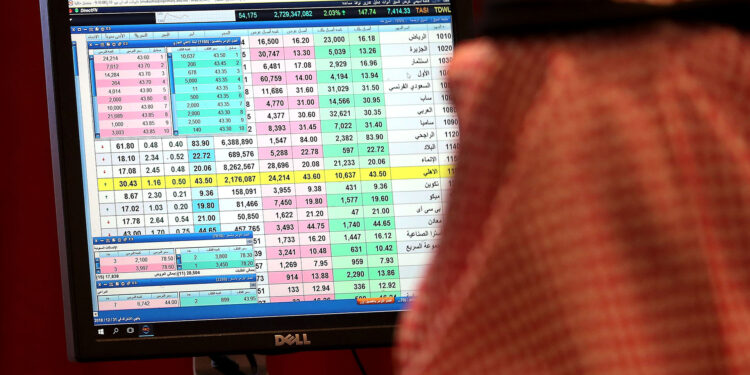The Saudi stock market is fluctuating after rising during the summer, as the Saudi capital market suffered its worst start in the last quarter in years with the escalation of regional tensions in an expansion of Israel’s war on the Gaza Strip, according to what Bloomberg reported in a report.
The broader Saudi Tadawul index fell 2.2% in the first three trading days of this October, at a time when Israel intensified its bombing of Lebanon and evaluated the response to the recent Iranian missile attacks.
Bloomberg reported that the Saudi stock index, after ignoring the escalating tensions and falling oil prices, the recent declines completely erased its gains since the beginning of the year.
Endurance
Bloomberg wondered whether the market was able to withstand further escalation in the conflict, with crude oil prices well below the levels required to finance the Kingdom’s economic diversification. For many investors, the answer is no, at least in the short term.
“Investors in general are afraid of wars and geopolitical conflicts,” NewVision Wealth Management CEO Ryan Lemand said, and stock markets in countries close to the expanding war may see “outflows.”
Jassem Al-Jubran, head of the research department at Aljazira Capital, expected that the market would remain under pressure in the short term, and that the Tadawul index would decline to 11,380 points (5% below last Thursday’s close), but he said that it may rise by the same percentage if conditions improve. In the region.
He said, “Concerns are increasing about the possibility of a direct military clash between regional parties. While Saudi Arabia aims to remain neutral, any escalation near the vital Strait of Hormuz would lead to a global crisis due to its importance in global oil supply chains.”
Bloomberg reported that oil prices will remain an integral part of the market; While Saudi Arabia has spent heavily to achieve the Saudi Vision 2030 to diversify the economy, it remains dependent on energy revenues, and the decline in oil prices has contributed to the need for recalculation regarding investment plans.
HSBC Holdings strategists downgraded Saudi stocks to “neutral” from recommending “overbuy,” pointing to near-term risks resulting from rising geopolitical risks and lower oil prices.
Oil prices are below the break-even point
Brent crude futures rose due to fears of an interruption in oil supplies, but they remain below $80 per barrel, which is a far cry from the $96 level that the Kingdom needs to balance its budget, according to the International Monetary Fund.
The Bloomberg Research unit places the so-called break-even point at $112 when looking at the spending of the Saudi Public Investment Fund.
However, Abdul Wahab Abed, acting CEO of SEDCO Capital, an $8.5 billion asset management firm, said oil would need to stay for some time below $69 a barrel to pose significant risks to the Saudi stock market.
Some investors, such as Razin Capital CEO Mohamed Al-Suwaid, see the heavy selling as an opportunity, saying, “Regional tensions always put temporary pressure on the market and provide us with good price discounts.”



